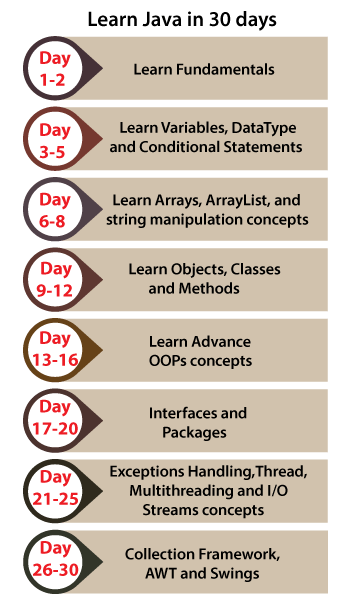How many days required to learn JavaJava programming is one of the mostly used programming languages. In the IT world, there are more than 8 million Java developers. The count of Java developers is rapidly growing. Learning Java doesn't make it possible to happen overnight, and it takes time and practice. It is very difficult to give the correct answer to the question of how many days required to learn Java? Because each person has not the same strength or learning power. The scope of Java programming is immense and provides a lot of carrier opportunities in the IT field. Everyone wants to learn Java programming as soon as possible, but it is not easy. To become a successful Java developer, the only way is to do the practice of all basics and advanced concepts of it. If we follow the following learning path, we can learn Java in one month only.  1) Day 1-2: Learn FundamentalsIf we are beginners in Java programming or other programming languages, we need to clear all the basics fundamentals of that language. Before diving into the core concept of Java, we need to learn about the introduction of language, features, applications, etc. After that, we should know how we can set up the Java runtime environment. We should also have to learn how we can create, compile and run the "Hello World" java program. At this level, we also need to explore the IDEs that help us to do Java programming. So, in the end of the day, we have knowledge of the following concepts:
2) Day 3-5: Learn Variables, DataTypes and Conditional StatementsAfter getting all the basics of Java programming, we are ready to go to the next step. We need to know some important concepts of Java-like DataTypes, Variables, and Conditional Statements. These concepts are the prerequisites for all the programming languages. In these two days we should have to gain knowledge of:
In the end of the day, we should create basic programs like swapping of numbers, Fibonacci series, Factorial, etc. 3) Day 6-8: Learn Arrays, ArrayList, and string manipulation conceptsAfter getting the knowledge of Java programming's prerequisites, we are ready to move on to some advanced concepts of it. In Java, String and Array are both important, and the developer should have detailed knowledge of them. At this step, we have to gain knowledge about:
Note: Moving to the next step, you have to make sure that all the above-discussed concepts are cleared in your mind.4) Day 9-12: Learn Objects, Classes and MethodsAfter getting knowledge about all the mentioned topics, we will have a decent base, which is necessary to learn any programming language. Now, we know that Java follows the concepts of OOPs, so we have to clear the concepts of Java's basic building blocks. We have to get the answers to all the following questions.
5) Day 13-16: Learn Advance OOPs conceptsNow, we are ready to dive into core Java programming. At this stage, we should have proper knowledge of Objects, Classes, and Methods. To learn Java, we should have command on the Oops concepts like Polymorphism, Encapsulation, Inheritance, and Abstraction because Java works on these principles. We should have to gain knowledge of the following concepts in two days.
6) Day 17-20: Interfaces and PackagesAfter knowing all the principles mentioned above, we are ready to go one step more. We have to learn about the Packages, Interfaces, Nested interfaces, and Abstract Classes in these four days. There are several packages like "Java.Lang", "Java.Time", and "Java.Math" are mostly used in Java programming. An interface can have several abstract methods, and if we implement that interface, we need to define its abstract methods in our programs. For that, we should have proper knowledge of interfaces and abstract classes and methods. So, in the end of the day, we should have knowledge of the following concepts:
7) Day 21-25: Exception Handling, Thread, Multithreading and I/O Streams conceptsOur program is always executed without having any error is not possible. There is always a chance of getting an error when we execute our program. So, we need to handle these errors so that our programs can execute even if it gets an error. We also have knowledge of how we can work with Files and use Regular Expressions in Java. Apart from that, we also have to gain knowledge of Thread and Multithreading concepts in Java. So, in the end of the day, we should have knowledge of the following concepts:
8) Day 26-30: Collection Framework, AWT and SwingsBefore going to the next step, we have to emphasize the implementation aspects of all the concepts and theoretical knowledge mentioned above. After that, we are ready to get knowledge about the advanced concepts. Collection Framework, Abstract Window Toolkit, and Swings are the most important advanced concept of Java. The Collection Framework defines several classes and interfaces to represent a collection of the object as a single unit. So, in the end of the day, we should have knowledge of the following concepts:
After one month, we have to do practice and only practice. We can also put our hands-on small projects and understand how the concepts work concurrently to complete a process. Next TopicImplicitly Typecasting in Java |

We provides tutorials and interview questions of all technology like java tutorial, android, java frameworks
G-13, 2nd Floor, Sec-3, Noida, UP, 201301, India












